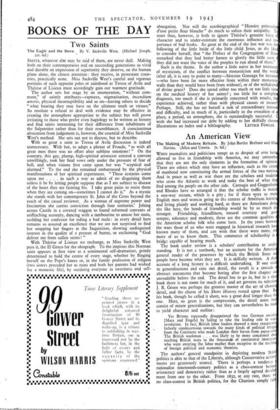BOOKS OF THE DAY
Two Saints
Snihrrs, whatever else may be said of them, are never dull. Making both on their contemporaries and on succeeding generations so vivid and durable an impression of superiority they deserve, on the human plane alone, the closest attention : they receive, in protestant coun- tries, practically none. Miss Sackville West's careful and vigorous portraits of such opposite poles of sainthood as Teresa of Avila and Therese of Lisieux must accordingly gain our warmest gratitude.
The author sets her stage by an enumeration, "without com- ment," of saintly attributes—raptures, stigmatisation, incendium ontoris, physical incorruptibility and so on—leaving others to decide "what bearing they may have on the ultimate truth or virtues." So resolute a refusal to deal with evidence may be effective in creating the atmosphere appropriate to the subject but will prove irritating to those who prefer even hagiology to be written as history and find saints interesting for their difference from inhabitants of the Salpetriere rather than for their resemblances. A conscientious abstention from judgement is, however, the essential of Miss Sackville West's method. She sets out not to discuss, but to describe.
With so great a saint as Teresa of Avila discussion is indeed unnecessary. With her, to adapt a phrase of Froude, "as with all great men there was no effort after sublime emotions!" On the contrary, this gay, plump, high-spirited aristocrat entered a convent unwillingly, took her final vows only under the pressure of fear of hell, and when visions first came upon her was "sceptical and alarmed." To the end she remained embarrassed by the physical manifestations of her spiritual experiences. "These ecstasies come upon me . . . . in such a way as admit of no disguising them unless it be by letting people suppose that as I am subject to disease of the heart they are fainting fits. I take great pains to resist them when they are coming on—sometimes I cannot do it." As a mystic she stands with her contemporary St. John of the Cross beyond the reach of the casual reviewer. As a woman of supreme power and fascination she carries conviction through four centuries!' Jolting across Castile in a covered waggon to found reformed convents of unflinching austerity, dancing with a tambourine to amuse her nuns, scolding her confessor for riding a bad mule: in every detail hers remains so assured an excellence that we are not surprised to find her snapping her fingers at the Inquisition, showing undisguised interest in the quality of a present of butter, or exclaiming "God deliver me from sullen saints! "
With Therese of Lisieux we exchange, as Miss Sackville West puts it, the El Greco for the oleograph. To the impious this Norman saint appears at first view as a sentimental self-dramatiser, grimly determined to hold the centre of every stage, whether by flinging herself on the Pope's knees or, in the family profession of religion (two sisters preceded her as nuns and both her parents had wished for a monastic life), by outdoing everyone in sweetness and self-
abnegation. Nor will the autobiographical " Histoire printanie d'une petite fleur blanche" do _much to soften their antipathy. T react thus, however, is both to ignore Therese's genuine force character and to under-estimate the enormous influence and im portance of bad books. So great at the end of the last war was th following of the little bride of the little child Jesus, as she lik to consider herself, that "the Prefect of the Congregation of Rite remarked that they had better hasten to glorify the little saint they did not want the voice of the peoples to run ahead of them."
Such is the theme. Is the author a little naive in her treatmen of mysticism, of the conflict between monasticism and the won, (after all, it is easy to point to many—Aloysius Gonzaga for instanc —who have been far more effective from within their monaste walls than they would have been from without), or of the withdraw of divine grace? Does she spend either too much or too little tim on the medical history of her saints? ; too little for a complet diagnosis, too much if she is primarily concerned with results, th experience achieved, rather than with physical causes or means Perhaps. Still, she has set herself a task of extraordinary interes and difficulty, and in much of it, particularly in the evocation of place, a period, an atmosphere, she is outstandingly successful. wish she had increased our debt by adding to her skilfully chose illustrations an index and a bibliography. LErficE FOWLER.


























 Previous page
Previous page